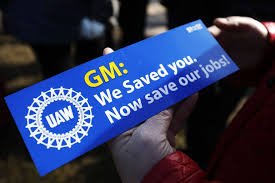
(BEDFORD) – Talks between the United Auto Workers union and General Motors “have taken a turn for the worse,” according to the union’s chief negotiator, suggesting that no immediate end is in sight.
Contract talks aimed at ending a 21-day strike by the United Auto Workers against General Motors hit a snag over production commitments according to a letter from UAW Vice President Terry Dittes.
Dittes says he doubts there will be a quick settlement.
On Sept. 1, nearly 50,000 workers went on halting work at 31 GM factories and 21 other facilities spread across nine states. It also led to layoffs at many of the 10,000 American suppliers that provide auto parts and other goods and services to GM. That may have furloughed as many as 200,000 additional workers at those companies, according to estimates. GM has had to halt work at some of its other plants in Canada and Mexico due to the strike, idling nearly 10,000 additional GM workers who are not part of the UAW.
According to Dittes, the union presented a proposal to GM officials on Saturday. Sunday morning GM rejected that proposal and reverted back to their previous offer that the union rejected.
“They reverted back to their last rejected proposal and made little change,” said Dittes’ letter. He said the union negotiators “could not be more disappointed” in GM’s position.
GM says it is committed to talking around the clock to resolve the dispute.
Dittes wrote that while both sides had made progress on important issues two days ago, the talks now “have taken a turn for the worse.”
Major issues in these talks include GM’s use of temporary workers, as well as the union’s demand that the company finds work for some or all of the four plants it announced it would close. GM has already halted work at an assembly line in Lordstown, Ohio, as well as transmission plants in Warren, Michigan, and Baltimore. It also plans to halt work at the Hamtramck assembly plant in Detroit early next year.
GM’s U.S. factories have been shut down since the workers walked out Sept. 16. Parts shortages also have forced the company to close plants in Mexico and Canada. The union wants GM to bring some production in Mexico to the United States.
Additional issues include wages and benefits and profit-sharing.
“The company has shown an unwillingness to fairly compensate the great workforce of the UAW,” said Dittes’ letter.
The strike has cost GM about $600 million in total lost profits through three weeks of the strike. Workers earn $250 per week in strike pay while they’re on the picket lines, about one-fifth of what they normally make.



